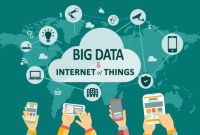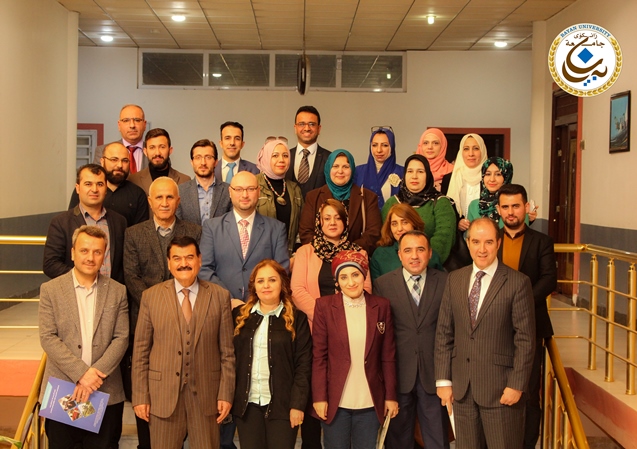 Bayan University (BNU) is pleased to announce its 7th Workshop on Internet of Things (IoT) with Arduino which will take place early Feb 2019. Internet of Things (IoT) is expected to emerge as a huge business opportunity for the Kurdistan Regional IT industry in the years ahead. The IoT is the interconnection via the Internet of computing devices embedded in everyday objects, enabling them to send and receive data. In other words, The Internet of things is the network of devices such as vehicles, and home appliances that contain electronics, software, sensors, actuators, and connectivity which allows these things to connect, interact and exchange data. Nowadays there are many Android and server-based applications. The measured value of sensors (e.g. temperature sensor, motion sensor, accelerometer sensor etc.) will be shown on a GUI or web server or android application through wireless communication and the device will be controlled automatically.
Bayan University (BNU) is pleased to announce its 7th Workshop on Internet of Things (IoT) with Arduino which will take place early Feb 2019. Internet of Things (IoT) is expected to emerge as a huge business opportunity for the Kurdistan Regional IT industry in the years ahead. The IoT is the interconnection via the Internet of computing devices embedded in everyday objects, enabling them to send and receive data. In other words, The Internet of things is the network of devices such as vehicles, and home appliances that contain electronics, software, sensors, actuators, and connectivity which allows these things to connect, interact and exchange data. Nowadays there are many Android and server-based applications. The measured value of sensors (e.g. temperature sensor, motion sensor, accelerometer sensor etc.) will be shown on a GUI or web server or android application through wireless communication and the device will be controlled automatically.
Bayan University (BNU) is holding a workshop to share with you the framework and concept of the upcoming revolution on Interconnected devices via the Internet. BNU discuss a series of concepts and applied samples that can engage the audience in futuristic views on communication. Please Join us!
Sessions 1: Introduction to the Internet of Things
Internet of Things (IoT) conceptualizes the idea of remotely connecting and monitoring real-world objects (things) through the Internet. In the past few years, the viability of IoT technology has been demonstrated, leading to increased possibilities for the novel, human-centric services in the smart cities. This development has resulted in numerous approaches being proposed for harnessing IoT for smart city applications. IoT-enabled applications are being rapidly developed in a number of domains such as energy management, waste management, traffic control, mobility, healthcare, ambient assisted living, etc.
Will be presented by Dhafer Sabah Al-Lahibi,
Dhafer S. Al-Lahibi is a lecturer at the Computer Science department / College of Education / Al-Hamdaniya University and has his MSc. in Computer Science from Osmania University in India.
Sessions 2: IoT Application; The Arduino Platform
In this session, the workshop will engage the participants with concepts and framework of the Arduino Open-Microcontroller Platform. Then it will provide information about Arduino Basics, what is Arduino, types of Arduino, the Arduino Board Layout and architecture and how the Arduino programming and interface of sensors work and communicate, there are two applications that will be demonstrated:
Project 1: Temperature and Humidity IOT Sensor System using Arduino.
Project 2: Motion Detection System using Arduino.
Will be presented by Alaa B Ali Baban,
Alaa B. Baban has got her BSc. in Computer Engineering and MSc. in Computer Engineering from Mosul University, and she has been working as a lecturer in Computer Science at the College of Engineering and Science at Bayan University since 2015.
Sessions 3: Big Data
Big data is the term for a collection of data sets so large and complex that it becomes difficult to process using on-hand database management tools or traditional data processing applications.

The challenges include capture, curation, storage, search, sharing, transfer, analysis, and visualization. The trend to larger data sets is due to the additional information derivable from analysis of a single large set of related data, as compared to separate smaller sets with the same total amount of data, allowing correlations to be found to "spot business trends, determine quality of research, prevent diseases, link legal citations, combat crime, and determine real-time roadway traffic conditions.”
Will be presented by Shahab Wahab Kareem,
Shahab Wahhab Kareem received his BSc in Control and Computer Engineering from University of Technology Baghdad in 2001, the MSc in Software Engineering from Salahadeen University in 2009. He is currently a PhD candidate in Yasar University Izmir, turkey. His research interests include Machine learning and Bigdata.
